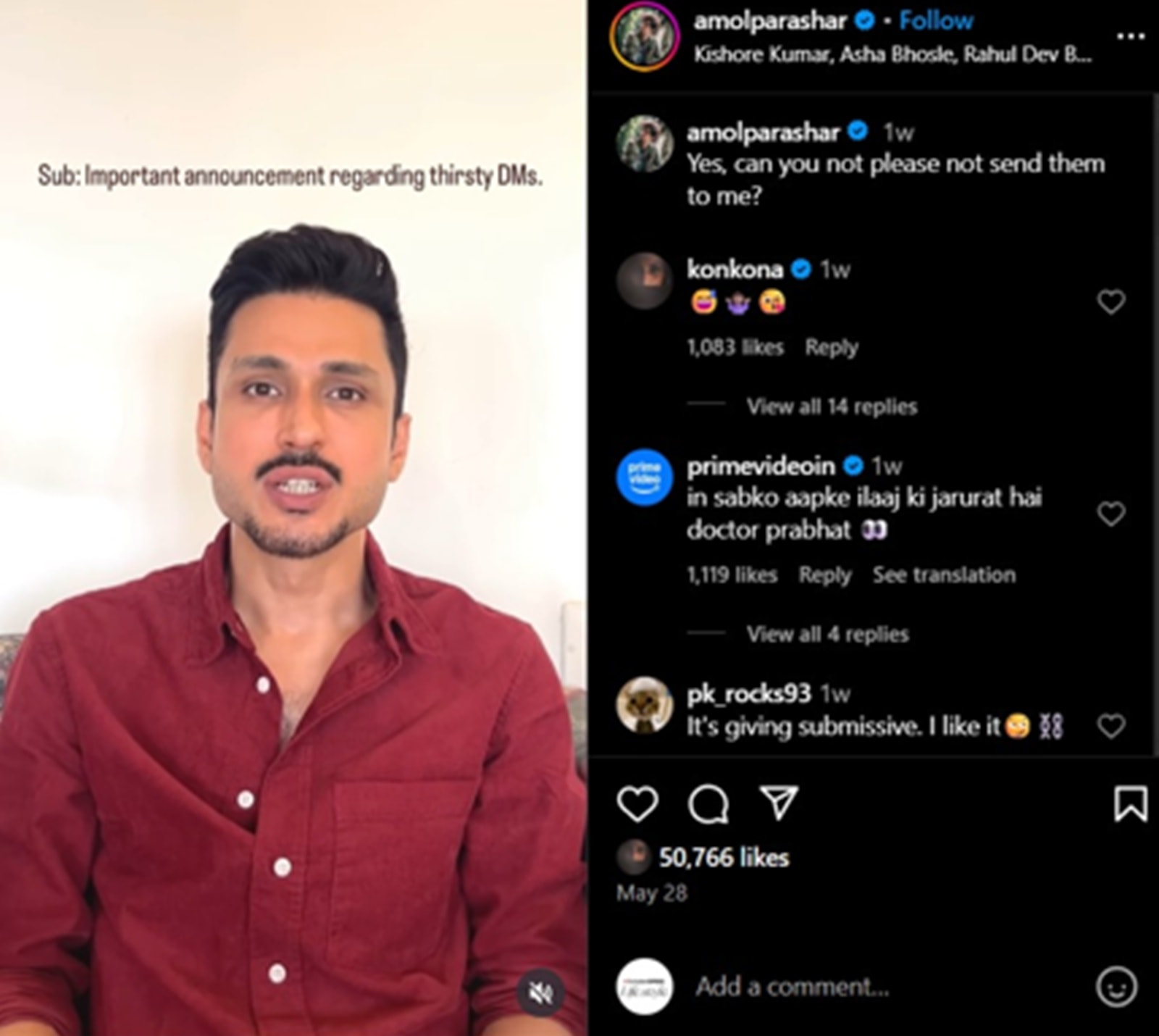📣 For more lifestyle news, click here to join our WhatsApp Channel and also follow us on Instagram
Amol Parashar has a request for all those sending him ‘thirsty DMs’: ‘I am sorry. But please…’
The video drew a range of reactions from his followers, with one remarking, "The problems I aspire to have"
 Amol Parashar opens up about 'thirsty DMs' (Photo: Amol Parashar/Instagram)
Amol Parashar opens up about 'thirsty DMs' (Photo: Amol Parashar/Instagram)Amol Parashar recently shared a video request to his fans and well-wishers who have sent him ‘thirsty DMs’, especially his female followers. “Important announcement regarding thirsty DMs,” the Gram Chikitsalay actor captioned the Instagram video.
“I know that you guys are loving my work. I have been receiving a lot of comments and direct messages, as well as memes, especially the ones that are a bit suggestive. I just wanted to say that…I don’t like it. I am not enjoying these. Please refrain from making such comments and DMs. Because I am not enjoying them. I don’t like it. I am sorry. But please, don’t do,” he says in a lighter vein as the camera zooms out a bit to show a knife being pointed at him (which users inferred as him dropping a hint he is not single) in the frame, and the song Bachke Rehna Re Baba plays in the background.
The video drew a range of reactions from his followers, with one remarking, “The problems I aspire to have”, while another wrote, “Even your reactions are damn cute. Now you are gonna receive many more DMs for sure”. His rumoured girlfriend, actor Konkona Sen Sharma, also reacted with emojis, “😅🤷🏽♀️😘.”
The actor may have taken these fan comments in jest, but let’s understand how such unsolicited messages on social media can be discomforting for many.
 Amol Parashar’s video post shows Konkona Sen Sharma’s comment (Photo: Amol Parashar/Instagram)
Amol Parashar’s video post shows Konkona Sen Sharma’s comment (Photo: Amol Parashar/Instagram)
Even though many would assume it was a compliment, it was more than just a passing remark, said Delnna Rrajesh, a psychotherapist and relationship life coach.
“It was a mirror held up to the silent discomfort many people, especially in the public eye, experience but rarely articulate. Because it’s not just about the DMs, it’s about consent. It’s about boundaries. It’s about the emotional weight of being objectified under the guise of admiration,” said Delnna.
 Here’s what to note (Photo: Freepik)
Here’s what to note (Photo: Freepik)
She expressed that unsolicited messages – especially those that are sexual- can trigger a cocktail of emotions: discomfort, anxiety, guilt, confusion, and even shame. “And it isn’t just women who face this. Men, too, often feel unable to express this discomfort because they’re expected to feel flattered,” said Delnna.
But attraction isn’t the problem. Entitlement is. According to Delnna, constantly receiving objectifying or boundary-crossing messages chips away at your sense of safety in digital spaces. “It creates emotional clutter. The brain starts to stay on guard. You begin second-guessing what to share, how to dress, and how to express joy without being misunderstood. That’s why speaking up publicly matters,” said Delnna.
It normalises the right to say “This doesn’t feel okay” without fear of judgment. And it sends a powerful message—no matter your gender, you have the right to define how you’re engaged with, even as a public figure, added Delnna.
How to navigate such situations?
Acknowledge your discomfort: Just because people say “take it as a compliment” doesn’t mean you have to. If it feels invasive, it is invasive.
Don’t personalise it: Unsolicited DMs are often more about the sender’s projections than your personality. It’s not your fault. It’s not your burden.
Set digital boundaries: You can block, report, limit who replies to your stories, or even take social detox breaks. “Boundaries are not rudeness. They are self-respect in action,” Delnna said.
Talk about it: Whether you’re a celebrity or not, sharing your discomfort can be liberating. “It gives others permission to acknowledge their own experiences and say ‘me too, ‘” said Delnna.
Replace shame with compassion: For yourself first. You did nothing wrong. You’re allowed to feel disturbed, to reset your energy, and to reclaim your space.
View this post on Instagram
When someone like Parashar shares this, it reshapes the cultural script, showing that being vocal doesn’t make you weak. “It makes you human. The more we talk about it, the less power silence has. The more we call it out, the more respectful our digital spaces become. Because no one should have to tolerate discomfort just because they’re visible. Your DM doesn’t give you a license to cross someone’s emotional space. Let’s teach that. Let’s live that,” said Delnna.
📣 For more lifestyle news, click here to join our WhatsApp Channel and also follow us on Instagram


- 01
- 02
- 03
- 04
- 05

























